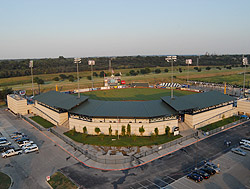 How do the Fort Worth Cats of the independent American Association compete with numerous other teams in the area? How do they compete in a year where a recession has decimated many?
How do the Fort Worth Cats of the independent American Association compete with numerous other teams in the area? How do they compete in a year where a recession has decimated many?
Faced with a tough challenge, they are fortunate enough to have found a little nitch in Forth Worth.
Success depends on attendance and if faced with a Dallas Mavericks-Phoenix Suns NBA game, that will hurt, but it will also hurt the Texas Rangers attendance and those attending a Dallas Stars game. You cannot help it; people love a big-time atmosphere!
Not everyone is able attend those games, which is a benefit to a team located 45 minutes from downtown Dallas. Loyal fans remember the nostalgic 1950’s Cats’ teams, something that today’s consumers are unfamiliar with.
Attendance is always to be one of the main issues of an Independent League team, but in today’s current economy, competing with local sports organizations is the least of their worries.
Amid all the speculation of the Forth Worth Cats being sold, general manager John Bilbow did confirm that team owner Carl Bell has been in negotiations to sell off the minor league franchise along with the property that runs along the Trinity River for months.
“He is in negotiations not only in regards to the team, but also the ballpark and surrounding real estate,” Bilbow said. “Carl’s goal is to preserve the future of the Cats and the Cats organization.”
Single or coupled deals, one is unsure, and the number of possible buyers is unclear, but Bilbow has said that some prospective buyers are interested in the team, while some are involved in a package deal that will include the local real estate.
According to the Star-Telegram, one name has been a constant in the discussions, Rainier Construction. Contact with Rainier has been limited as founder Mike Balloun has not been available for contact.
Uncited sources have also stated the Bell has valued the Cats and the surrounding area, which totals 60 acres, at approximately $40 million, though that number is not confirmed.
Independent franchises do face an uphill battle; they are geared toward cost-efficient family entertainment while dealing with the impending loss of star players to affiliated clubs. A “revolving door” for players is what it sometimes feels like.
The Fort Worth Cats had a potential number one pick in their grasp in 2006 with Luke Hochevar. How can they compensate for that kind of loss? By being prepared. By having a list of players who are available and ready to sign in case you need to sign someone on quick notice. Unfortunately for the Cats, Hochevar, using them as bargaining chip, played only four games.
In this complex situation, LaGrave Field is the main asset. The field has a rich history. A history dating back to 1926 and has seen the likes of Duke Snider, Maury Wills, Babe Ruth, Lou Gehrig, Joe DiMaggio, and Jackie Robinson pass through.
A former minor league affiliate of the Brooklyn Dodgers, (1946-1956) many have seen extensive change over the years just like LaGrave field; being destroyed in 1967, but reborn by Bell when he purchased the 14 acre lot in 2001 and brought the Fort Worth Cats back to life. Considered one of the most historic fields, it has sentimental value to go along with the immense financial one.
Beginning to be a haven for pro sports franchises in the recent months is the Trinity Uptown Project. It was a possible location for the new Dallas Cowboys Stadium, and most recently part of a $500 million multi-functional project in the eyes of United League Baseball. The downturn in the economy has not stopped local sports enthusiasts, as the area around the field is central to plan for the financing of the project.
The move for baseball be it minor league or independent is a move to the larger metropolitan areas. To bring baseball back in the limelight, into the downtown area of a city, this would bring in young professionals, along with their families.
A team rich in baseball history of almost 100 years, you would want to keep the team in Fort Worth, and after asked about the team’s future, Bilbow feels the same.
“I am confident that somehow, somewhere there will be baseball in Fort Worth next year.”
It sounds great, but a lot depends on what happens with the outcome of the stadium purchase and surrounding property. The worst-case scenario is the team being sold to a separate buyer, with the land including the stadium, and is sold off in pieces.
The recession can stunt urban land growth, meaning the possible land deal could have investors sitting on the property for years waiting for the value to increase, leaving the city and the fans without a team that has grabbed the hearts of many. Time is now of the essence as the team has to make the necessary commitments for the ever-fast approaching 2010 season.
Devon Teeple is an author for the Business of Sports Network, which includes the Biz of Baseball, the Biz of Football, the Biz of Basketball and the Biz of Hockey. He is a former professional baseball player with the River City Rascals & Gateway Grizzlies.
Devon is a former student within Sports Management Worldwide’s Baseball General Manager Class. Devon is the founder of The GM’s Perspective and is a intern with The Football Outsiders and contributor with the Plymouth River Eels.
Currently, Devon is a Branch Manager at a financial institution in Southern Ontario Canada. He can be reached at thegmsperspective@gmail.com or devon@businessofsportsnetwork.com
Follow The GM’s Perspective on Facebook and Bleacher Report






I thought this article was great. I remember my dad talking about the Cats back in the day…maybe I’ll see them play!
Thanks. I find your articles filled with interesting info.